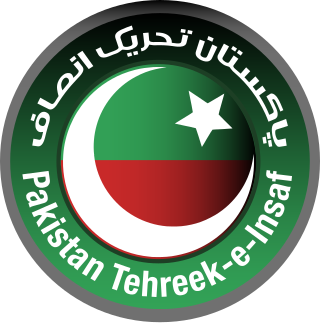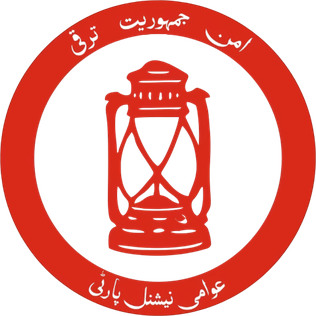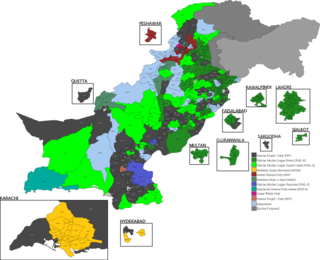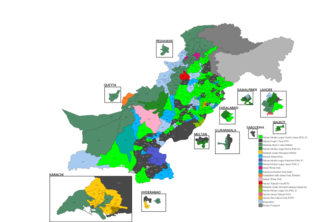Related Research Articles

The Pakistan Muslim League (Nawaz) (Urdu: پاکستان مسلم لیگ (ن), abbr.PML(N) or PML-N) is a centre-right, conservative liberal political party in Pakistan. It is currently the third-largest party in the Senate. The party was founded in 1993, when a number of prominent conservative politicians in the country joined hands after the dissolution of Islamic Democratic Alliance, under the leadership of former Prime Minister Nawaz Sharif. The party's platform is generally conservative, which involves supporting free markets, deregulation, lower taxes and private ownership. Although the party historically supported social conservatism, in recent years, the party's political ideology and platform has become more liberal on social and cultural issues; however, members have been accused of using Islamist populist rhetoric. Alongside the Pakistan Tehreek-e-Insaf (PTI) and Pakistan Peoples Party (PPP), it is one of the three major political parties of the country.

The Pakistan Muslim League Urdu: پاکستان مسلم لیگ (ق); Pākistān Muslim Līg (Qāf), Acronyms: PML(Q), PML-Q, PMLQ, "Q League") is a political party in Pakistan. As of the 2018 parliamentary election, it has a representation of 5 seats. It previously served as an ally of former Prime Minister Raja Pervez Ashraf's government, and led a joint election campaign in 2013 alongside Pakistan Peoples Party (PPP) in Punjab and Balochistan provinces against its rival Pakistan Muslim League (N), a fiscally conservative and centre-right force.

The Muttahida Majlis–e–Amal is a political alliance consisting of conservative, Islamist, religious, and right-wing parties of Pakistan. Naeem Siddiqui proposed such an alliance of all the religious parties back in the 1990s.

Ghulam Mustafa Jatoi was a Pakistani politician who served as the Caretaker Prime Minister of Pakistan for three months, from 6 August 1990 to 6 November 1990. Ghulam Mustafa Jatoi's ancestors were Murids of the Pir's of Sarhandi.

Since its establishment in 1947, Pakistan has had a non-symmetric federal government and is a federal parliamentary democratic republic. At the national level, the people of Pakistan elect a bicameral legislature, the Parliament of Pakistan. The parliament consists of a lower house called the National Assembly, which is elected directly, and an upper house called the Senate, whose members are chosen by elected provincial legislators. The head of government, the Prime Minister, is elected by the majority members of the National Assembly and the head of state, the President, is elected by the Electoral College, which consists of both houses of Parliament together with the four provincial assemblies. In addition to the national parliament and the provincial assemblies, Pakistan also has more than five thousand elected local governments.

The Pakistan Tehreek-e-Insaf is a political party in Pakistan established in 1996 by Pakistani cricketer and politician Imran Khan, who served as the country's prime minister from 2018 to 2022. The PTI ranks among the three major Pakistani political parties alongside the Pakistan Muslim League–Nawaz (PML–N) and the Pakistan People's Party (PPP), and it is the largest party in terms of representation in the National Assembly of Pakistan since the 2018 general election. With over 10 million members in Pakistan and abroad, it claims to be the country's largest political party by primary membership, as well as one of the largest political parties in the world.

The Awami National Party is a Pashtun nationalist, secular and leftist political party in Pakistan. The party was founded by Abdul Wali Khan in 1986 and its current president is Asfandyar Wali Khan, grandson of Bacha Khan, with Mian Iftikhar Hussain serving as the Secretary-General. Part of the PPP-led cabinet of the Pakistani government during 2008−13, ANP's political position is considered left-wing, advocating for secularism, public sector government, and social egalitarianism.
The Sindh Democratic Alliance was a regional political party in Pakistan. The party was created by the bureaucrat-turned-politician Imtiaz Shaikh in mid-2001. He was formerly a right-hand man of Jam Sadiq Ali, who was the Chief Minister of Sindh from 1990 until he was murdered in 1992. At the behest of the military government, he resigned from the government post and formed SDA. Arbab Ghulam Rahim, the former chief minister Sindh and former Speaker Sindh Assembly Syed Jalal Mehmood Shah were also one of the leaders of SDA.
The Pakistan Muslim League (J) (Urdu: پاکستان مسلم لیگ ج) is a political party in Pakistan established in 1988.

The Pakistan Muslim League (Functional) (Urdu: پاکستان مسلم لیگ (ف), acronym: PMLF, PML-F, PML (F)) is a nationalist and pro-Hurs clan political party in Pakistan. It is one of the Pakistan Muslim Leagues. The letter 'F' in its name stands for functional. It is primarily associated with the Sindhi religious leader Pir Pagara. It was formed in 1985 when the Pakistani establishment decided to make Muhammad Khan Junejo the president of united PML. In response, Pir Pagara Syed Shah Mardan Shah-II parted ways with the mother league and formed his own party.
Mumtaz Ali Khan Bhutto, was a Pakistani politician who served as 8th Governor of Sindh and later the 13th Chief Minister of Sindh. He was also the first cousin of late Zulfiqar Ali Bhutto, who was the Prime Minister of Pakistan from 1973 to 1977.

General elections were held in Pakistan on 18 February 2008 to elect members of the 13th National Assembly and the four Provincial Assemblies.
Arbab Ghulam Rahim is a Pakistani politician who served as the Chief Minister of the Government of Sindh from 2004 until 2007.

General elections were held in Pakistan on 10 October 2002 to elect the 12th National Assembly and four Provincial Assemblies. The elections were held under the military government of Pervez Musharraf. The two mainstream parties, Pakistan Peoples Party (PPP) and Pakistan Muslim League (N) (PML-N) had several restrictions imposed on them and their leaders Benazir Bhutto and Nawaz Sharif were in exile. In order to address the restrictions, PPP created the Pakistan Peoples Party Parliamentarians (PPPP) under the leadership of Ameen Faheem, to contest the elections on its behalf. The PML-N meanwhile, suffering from the party's division into two factions: one that remained loyal to Sharif and were contesting the elections under the leadership of Javed Hashmi, and the other which had broken away to form the pro-Musharraf Pakistan Muslim League (Q) (PML-Q) under the leadership of Mian Muhammad Azhar. The emergence of the PML-Q marked the beginning of multi-party politics in the country, bringing an end to the decade-long two-party system between the PPP and PML-N.

The National People's Party (NPP) was a political party located in Pakistan. It was founded in 1986 by Ghulam Mustafa Jatoi after he had a disagreement with Benazir Bhutto, subsequently leaving the Pakistan Peoples Party.

Fahmida Mirza is a Pakistani politician who was Federal Minister for Inter Provincial Coordination, in office from 20 August 2018 until 10 April 2022. She served as the 18th and only woman Speaker of the National Assembly of Pakistan from March 2008 to June 2013.

An indirect presidential election was held on 6 September 2008 in Pakistan. The Electoral College of Pakistan – a joint sitting of the Senate, National Assembly and Provincial Assemblies – elected a new president after the resignation of President Pervez Musharraf. As required by the constitution, Muhammad Mian Soomro automatically became acting president on 18 August 2008, upon the resignation of Musharraf. The constitution required that a new president be elected by Parliament within 30 days; Soomro was considered loyal to Musharraf, and it was considered certain that he would be replaced in that election.
Liaquat Ali Jatoi is a Pakistani politician who was Chief Minister of Sindh during 1997–1998.

The Grand Democratic Alliance is a regionalist political alliance based in Sindh, Pakistan. It was founded on 23 October 2017 as a movement against the Pakistan Peoples Party (PPP) government in Sindh, accusing it of poor governance, fascism and corruption. The alliance claims that the people of Sindh are unhappy with the PPP government.
References
- ↑ Mansoor, Hasan (February 2003). "The pathology of military democracy: Manufacturing a government in Sindh". Himal South Asia. Archived from the original on 2008-01-10.
- ↑ Mumtaz, Ashraf (May 20, 2004). "Parties to inform EC about merger with PML". Dawn.